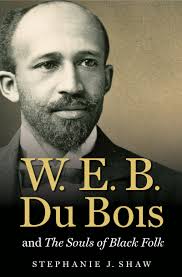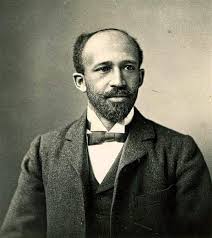The Souls of Black Folk Page #19
The Souls of Black Folk is a 1903 work of American literature by W. E. B. Du Bois. It is a seminal work in the history of sociology and a cornerstone of African-American literature. The book contains several essays on race, some of which the magazine Atlantic Monthly had previously published.
“Entbehren sollst du, sollst entbehren.” They made their mistakes, those who planted Fisk and Howard and Atlanta before the smoke of battle had lifted; they made their mistakes, but those mistakes were not the things at which we lately laughed somewhat uproariously. They were right when they sought to found a new educational system upon the University: where, forsooth, shall we ground knowledge save on the broadest and deepest knowledge? The roots of the tree, rather than the leaves, are the sources of its life; and from the dawn of history, from Academus to Cambridge, the culture of the University has been the broad foundation-stone on which is built the kindergarten’s A B C. But these builders did make a mistake in minimizing the gravity of the problem before them; in thinking it a matter of years and decades; in therefore building quickly and laying their foundation carelessly, and lowering the standard of knowing, until they had scattered haphazard through the South some dozen poorly equipped high schools and miscalled them universities. They forgot, too, just as their successors are forgetting, the rule of inequality:—that of the million black youth, some were fitted to know and some to dig; that some had the talent and capacity of university men, and some the talent and capacity of blacksmiths; and that true training meant neither that all should be college men nor all artisans, but that the one should be made a missionary of culture to an untaught people, and the other a free workman among serfs. And to seek to make the blacksmith a scholar is almost as silly as the more modern scheme of making the scholar a blacksmith; almost, but not quite. The function of the university is not simply to teach bread-winning, or to furnish teachers for the public schools or to be a centre of polite society; it is, above all, to be the organ of that fine adjustment between real life and the growing knowledge of life, an adjustment which forms the secret of civilization. Such an institution the South of to-day sorely needs. She has religion, earnest, bigoted:—religion that on both sides the Veil often omits the sixth, seventh, and eighth commandments, but substitutes a dozen supplementary ones. She has, as Atlanta shows, growing thrift and love of toil; but she lacks that broad knowledge of what the world knows and knew of human living and doing, which she may apply to the thousand problems of real life to-day confronting her. The need of the South is knowledge and culture,—not in dainty limited quantity, as before the war, but in broad busy abundance in the world of work; and until she has this, not all the Apples of Hesperides, be they golden and bejewelled, can save her from the curse of the Boeotian lovers. The Wings of Atalanta are the coming universities of the South. They alone can bear the maiden past the temptation of golden fruit. They will not guide her flying feet away from the cotton and gold; for—ah, thoughtful Hippomenes!—do not the apples lie in the very Way of Life? But they will guide her over and beyond them, and leave her kneeling in the Sanctuary of Truth and Freedom and broad Humanity, virgin and undefiled. Sadly did the Old South err in human education, despising the education of the masses, and niggardly in the support of colleges. Her ancient university foundations dwindled and withered under the foul breath of slavery; and even since the war they have fought a failing fight for life in the tainted air of social unrest and commercial selfishness, stunted by the death of criticism, and starving for lack of broadly cultured men. And if this is the white South’s need and danger, how much heavier the danger and need of the freedmen’s sons! how pressing here the need of broad ideals and true culture, the conservation of soul from sordid aims and petty passions! Let us build the Southern university—William and Mary, Trinity, Georgia, Texas, Tulane, Vanderbilt, and the others—fit to live; let us build, too, the Negro universities:—Fisk, whose foundation was ever broad; Howard, at the heart of the Nation; Atlanta at Atlanta, whose ideal of scholarship has been held above the temptation of numbers. Why not here, and perhaps elsewhere, plant deeply and for all time centres of learning and living, colleges that yearly would send into the life of the South a few white men and a few black men of broad culture, catholic tolerance, and trained ability, joining their hands to other hands, and giving to this squabble of the Races a decent and dignified peace? Patience, Humility, Manners, and Taste, common schools and kindergartens, industrial and technical schools, literature and tolerance,—all these spring from knowledge and culture, the children of the university. So must men and nations build, not otherwise, not upside down. Teach workers to work,—a wise saying; wise when applied to German boys and American girls; wiser when said of Negro boys, for they have less knowledge of working and none to teach them. Teach thinkers to think,—a needed knowledge in a day of loose and careless logic; and they whose lot is gravest must have the carefulest training to think aright. If these things are so, how foolish to ask what is the best education for one or seven or sixty million souls! shall we teach them trades, or train them in liberal arts? Neither and both: teach the workers to work and the thinkers to think; make carpenters of carpenters, and philosophers of philosophers, and fops of fools. Nor can we pause here. We are training not isolated men but a living group of men,—nay, a group within a group. And the final product of our training must be neither a psychologist nor a brickmason, but a man. And to make men, we must have ideals, broad, pure, and inspiring ends of living,—not sordid money-getting, not apples of gold. The worker must work for the glory of his handiwork, not simply for pay; the thinker must think for truth, not for fame. And all this is gained only by human strife and longing; by ceaseless training and education; by founding Right on righteousness and Truth on the unhampered search for Truth; by founding the common school on the university, and the industrial school on the common school; and weaving thus a system, not a distortion, and bringing a birth, not an abortion. When night falls on the City of a Hundred Hills, a wind gathers itself from the seas and comes murmuring westward. And at its bidding, the smoke of the drowsy factories sweeps down upon the mighty city and covers it like a pall, while yonder at the University the stars twinkle above Stone Hall. And they say that yon gray mist is the tunic of Atalanta pausing over her golden apples. Fly, my maiden, fly, for yonder comes Hippomenes!
Translation
Translate and read this book in other languages:
Select another language:
- - Select -
- 简体中文 (Chinese - Simplified)
- 繁體中文 (Chinese - Traditional)
- Español (Spanish)
- Esperanto (Esperanto)
- 日本語 (Japanese)
- Português (Portuguese)
- Deutsch (German)
- العربية (Arabic)
- Français (French)
- Русский (Russian)
- ಕನ್ನಡ (Kannada)
- 한국어 (Korean)
- עברית (Hebrew)
- Gaeilge (Irish)
- Українська (Ukrainian)
- اردو (Urdu)
- Magyar (Hungarian)
- मानक हिन्दी (Hindi)
- Indonesia (Indonesian)
- Italiano (Italian)
- தமிழ் (Tamil)
- Türkçe (Turkish)
- తెలుగు (Telugu)
- ภาษาไทย (Thai)
- Tiếng Việt (Vietnamese)
- Čeština (Czech)
- Polski (Polish)
- Bahasa Indonesia (Indonesian)
- Românește (Romanian)
- Nederlands (Dutch)
- Ελληνικά (Greek)
- Latinum (Latin)
- Svenska (Swedish)
- Dansk (Danish)
- Suomi (Finnish)
- فارسی (Persian)
- ייִדיש (Yiddish)
- հայերեն (Armenian)
- Norsk (Norwegian)
- English (English)
Citation
Use the citation below to add this book to your bibliography:
Style:MLAChicagoAPA
"The Souls of Black Folk Books." Literature.com. STANDS4 LLC, 2024. Web. 28 Dec. 2024. <https://www.literature.com/book/the_souls_of_black_folk_310>.




Discuss this The Souls of Black Folk book with the community:
Report Comment
We're doing our best to make sure our content is useful, accurate and safe.
If by any chance you spot an inappropriate comment while navigating through our website please use this form to let us know, and we'll take care of it shortly.
Attachment
You need to be logged in to favorite.
Log In